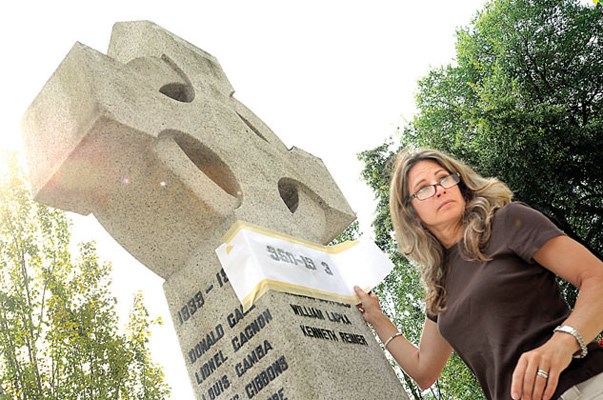Horace Lee; John Simpson; Francis Matier; Allan Osborne; Ferdinand Treichel; William Dutfield; Kenneth Reimer and William Lapka.
The eight names above belong to eight lost souls from Richmond; brave men who fought and died in the First World War, Second World War and Korean War.
Eight men whose ultimate sacrifice had either been forgotten and faded away through the passage of time or had, for generations, flown under the radar with little or no honour or recognition.
On Monday morning, that all changed.
After more than 75 hours of dogged research by Matthew McBride, eight local lives wiped out by war will shine brightly on the citys cenotaph.
McBride, a retired Navy diver and amateur historian, looked on with arms folded tight and chest bursting with pride as Ebco Industries Joe DaSilva and Monica Eppich Feldman prepared to place the first letter of the first of eight new names on the memorial at city hall.
Im a happy guy today, said McBride.
These guys deserve it and thats why I did it, I guess. Its been a labour of love, Im totally thrilled and it really is the right thing to do.
We all have a role to play and this really is an important thing thats happening here. Someone in each community has to remember what went before us.
McBride, who has a number of friends who are D-Day veterans and are in their 90s, stumbled across the possibility of forgotten Richmondite war dead while researching for someone elses relative who fought in one of the world wars.
I couldnt find anything on this soldier, but the relative swore he was from Richmond, McBride recalled.
Then I started looking for soldiers from Steveston and London Landing and bang, bang, there they were, all these names started showing up.
Hours upon hours later, McBride had uncovered the names of what he thought were 15 soldiers who died in either one of the two world wars or in the Korean War.
He then contacted the City of Richmond about looking into updating the cenotaph with the names hed uncovered.
The city, through the Richmond Museum and its archives, picked up the ball and carried out its own research.
After about a month of double-checking McBrides work, Rebecca Forest, Richmond Museum curator, whittled the names down to eight after discovering that some had never lived in Richmond or their names were already on another citys cenotaph.
Its been a fascinating project and a real honour to work on something like this, Forest said at the cenotaph Monday.
It was wonderful when Matthew contacted us. I also never assumed that family members (of the soldiers) would be out there, but we have been in touch with some and hopefully more will come forward in the weeks ahead.
This is such a marker of the community and of the people who live here.
In the past, Forest said, it was really up to the family members to bring the names forward. And then with so many wars, those family members may also have died, so there was no one left to come forward.
But with modern technology, we can track these things much better now, she added.
After the research, we were looking for a company that could create the letters to match the ones already on the cenotaph.
The first names went up in the 20s, so it was not easy. We searched all over the USA and Canada, and then we realized a member of the Richmond Museum Society board was in the metal fabrication business.
That member was DaSilva, who, along with Feldman, spent most of Monday painstakingly placing the names of the fallen onto the cenotaph.
The metal was powder-coated and then cut by water jet from metal sheets, explained DaSilva of the process.
The letters were very hard to match (with the ones already on the cenotaph). A special glue, which will set within 24 hours, will keep the letters in place and will last for many, many years.
The whole operation is being financed from the Richmond Poppy Fund and a re-dedication of the cenotaph will be carried out by the Royal Canadian Legion and the city on Oct. 14.
Its a date that will be embedded into the diary of McBride, whose family is steeped in world war history, with his grandfathers and father each fighting in at least one of the world wars.
I grew up around these guys and was surrounded by stories of the war all my life. You could say Im obsessed by the First World War, he said.
This means a lot to me. The overall sacrifices made by very ordinary people in extraordinary circumstances is what gets me.
This is about human lives and thats one of the reasons I carried out the research. I did this for the community, however, not for me.



